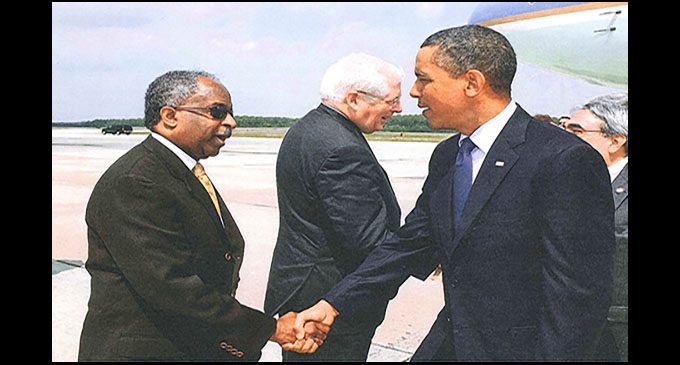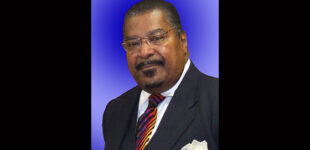W-S native steps down as Durham mayor

After 16 years, Durham Mayor William “Bill” Bell, a Winston-Salem native, stepped down as the Bull City’s titular government leader Dec. 4. Under his leadership, the city has gone from being perceived as a sleepy little also-ran to nearby neighbor Raleigh, to now being one of the hottest, ever-growing destination areas in the Southeast, with jewels in the crown like North Carolina Central University, Duke University, the American Tobacco District, Duke Medical Center, and of course, the Durham Performing Arts Center, attracting tens of thousands of new businesses and residents.
He looked back with pride, couched in his trademark cool, insight and thoughtfulness.
“By and large, we’ve sort of found a niche,” Bell said, regarding why Durham is such a hot location right now. ‘Durham is sort of a funky-type town anyway. With the revitalization we’ve had downtown, and the way we’ve done it, up until the past few years, it has all been renovations of existing factories.
“Now we’ve got new buildings that are coming on line, but as a part of that, we’ve created a place to be, rather than a place to be away from, particularly in downtown. People are able to work there; live there; entertainment – DPAC has been a great success, the Durham Bulls a tremendous success. With that has come restaurants, and we’ve come to be known as sort of the ‘foodie’ type town in the south. More hotels, so all of those things coming together, I think have sort of put a spotlight on Durham, in terms of what it had been in the past.”
William Bell was born in Washington, DC, but was raised in Winston-Salem. After graduating from Atkins High School, which was segregated, Bell attended Howard University from 1957 -61, where he studied engineering. Bell was 16 when he finished.
In college, Bell was in the ROTC, and after Howard, he went to work at Martin Marietta in Orlando, Florida. But soon, the US Army called, and he found himself stationed at an Army base in New Jersey, where he was in charge of research and development labs.
When Bell left the Army, he continued to work in research and development. He later attended grad school at NY University, getting his Masters Degree in electrical engineering. In 1968, IBM hired Bell to come back to North Carolina to work. Bell moved to Durham, and from then on, he found himself involved in local politics.
Bell recalls how in the early days, he and a delegation from Durham would travel to other growing metropolitan cities to see how they were managing their attributes. Now, delegations from other cities like Dayton, Ohio and Columbia, S.C. are all coming to Durham to get their own primers on good growth, responsible management, and rebuilding their downtown areas.
Durham’s renaissance on Mayor Bell’s watch has also attracted young entrepreneurs, like software engineers, to the city, with new ideas, new businesses, and capital to grow. Developers and outside investors have also found their way to the Bull City to build new apartment complexes, houses and condos.
Bell was elected in 2001, after serving 26 years as a Durham County commissioner, chairing the board from 1982 to 1994. Bell then lost an election, only to come back in 1996 and 1998.
“You’ve got steep walls to climb, but if you get there, there’s a certain level of success,” Bell says proudly.
The Duke Lacrosse case; the I-85 drug route; poverty; gang violence; police abuse – most observers would call each of those infamous episodes from Durham’s recent history “big problems.” But because they happened on Mayor Bill Bell’s watch, he prefers to call them “challenging times,” and he worked diligently, in concert with the City Council and community leaders to effectively deal with every one of them.
Bell has also been insistent on revitalizing inner city neighborhoods, thus improving the quality of life for low-wealth areas of the city like Northeast Central Durham. That also involved tackling the crime problem in many of those neighborhoods.
Mayor Bell focused on the task by getting monthly crime reports from the Durham Police Dept. on violent crime. That allowed communities to focus more on the problems, and work hand-in-hand with law enforcement to solve them. The result was a steady decline in the violent crime rate from 2001 to 2013, Bell says.
But thanks to a proliferation of drugs and guns on the street, the violent crime rate began inching back up in 2013, he continued. Adding to that, youth gang violence, with some as young as 16-years of age. The mayor saw fit to create a Violence Reduction Committee – a cadre of law enforcement and judicial officials – that focused on what the sources of the problem were, and devise effective solutions.
Creating more affordable housing has also been a key priority for the eight-term mayor, and convincing the rest of the council to purchase unsuccessful properties, and then partner with developers to created mixed-income complexes, has been an exciting and productive challenge.
In 1972, he ran for Durham County Commissioners and won, and in 2001, he was elected mayor, and has been in office for 16 years.
On Nov. 7, Councilman Steve Schewel, who was sworn-in Dec. 4, defeated former Councilman Farad Ali to become Durham’s next mayor.
As Mayor Bell prepared to leave office, it was with a definite feeling of accomplishment. True, there were still some things that he wanted to accomplish that the clock ran out on him on, but the mayor has laid the groundwork for the progress to continue. The people of Durham have been celebrating Bill Bell’s tenure, and wishing him well.
There can be no question that William Bell will go down in North Carolina history as one of the best, most influential mayors ever to lead a Tar Heel city.













